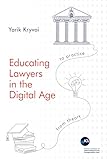Educating lawyers in the digital age : from theory to practice / Yarik Kryvoi
Publication details: London British Institute of International and Comparative Law 2025Description: 247 pages, 22 cmISBN:- 9781905221974 (Paperback)
- 340.0715
| Item type | Current library | Shelving location | Call number | Materials specified | Status | Notes | Barcode | |
|---|---|---|---|---|---|---|---|---|
 BOOKs
BOOKs
|
National Law School | New Arrival - Display Area | 340.0715 KRY (Browse shelf(Opens below)) | PB | Not For Loan | Gift for the author | 40427 |
Browsing National Law School shelves,Shelving location: New Arrival - Display Area Close shelf browser (Hides shelf browser)
Introduction -
What is this book about? -
Part I. The Unique Features of Legal Education and Online Learning:
1. The Unique Features of Legal Education -
2. Online Technologies in Legal Education -
Part II. Applying Education Theories to the Teaching of Law ;
3. Scaffolding and Narratives for Learning -
4. Conversational Framework -
5. Learning Through Video -
6. Designing Videos for Online Learning -
7. What Do Learners Like in Online Courses? -
8. Putting Theory Into Practice: Creating an Online Course -
9. What Works in Design for Legal Education? -
Part III. Making Legal Education More Relevant To The Practice Of Law:
10. The Seven Essential Legal Skills -
11. Making Legal Education More Relevant To The Practice Of Law -
Part IV. Making Legal Education More Affordable:
13. Making Legal Education More Affordable to Learners and Educators -
Part V. Learning Design Principles for Legal Education:
14. Learning Design Principles for Lawyers -
Bibliography.
This book takes a practical, design-based research approach to enhance and refine learning design principles for legal education. Drawing on extensive research conducted at University College London, including interviews with legal practitioners, students, and educators, it explores what sets legal education apart from other fields. It identifies what works in online courses and offers strategies to bridge the gap between academic learning and real-world legal practice, making legal education more effective and affordable.
The book formulates seven essential legal skills and provides practical guidance on teaching these skills in both traditional and online learning environments. It also introduces a comprehensive set of learning design principles tailored to legal education. While the focus is on the legal field, the findings and recommendations have broader applications across various disciplines.
There are no comments on this title.







